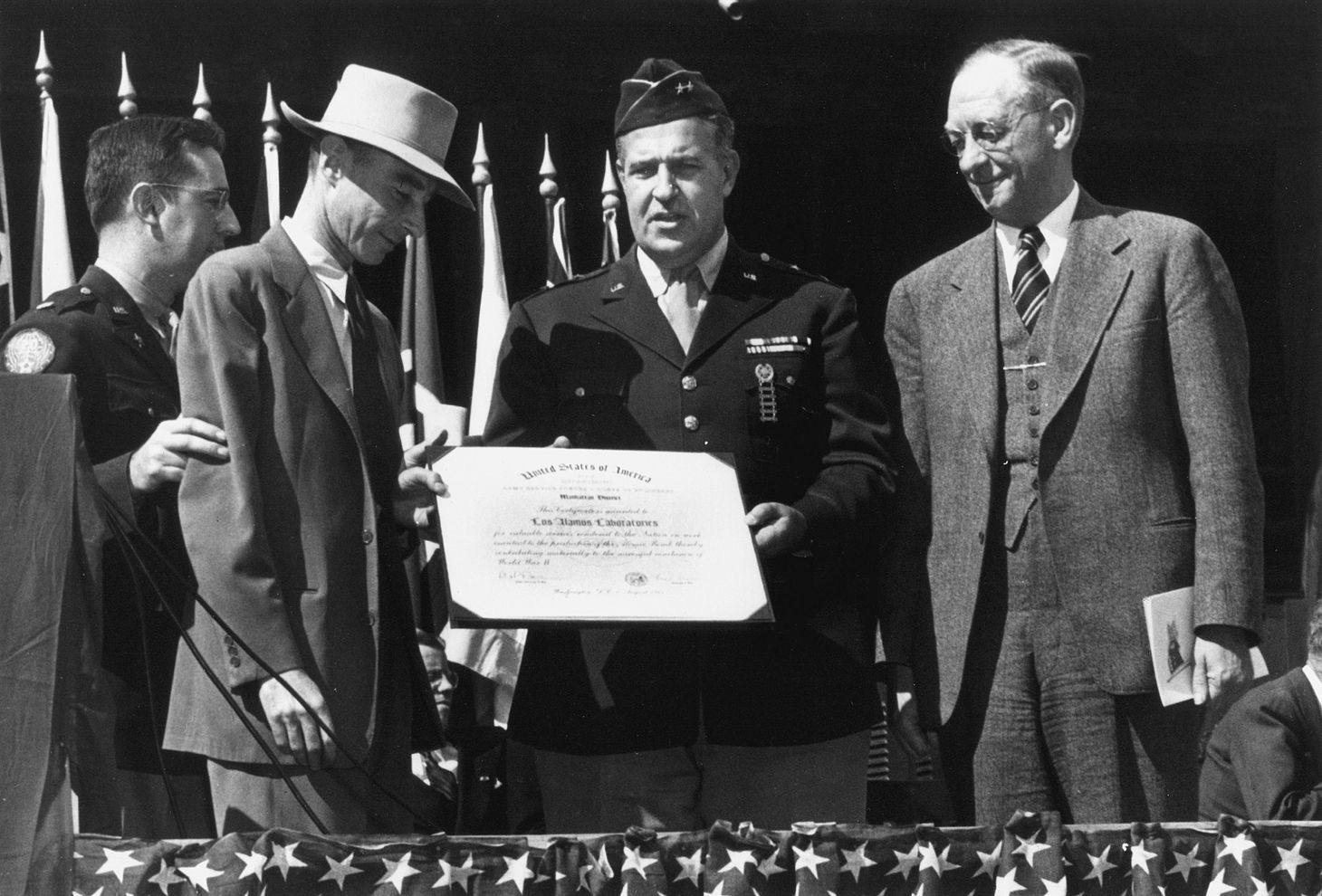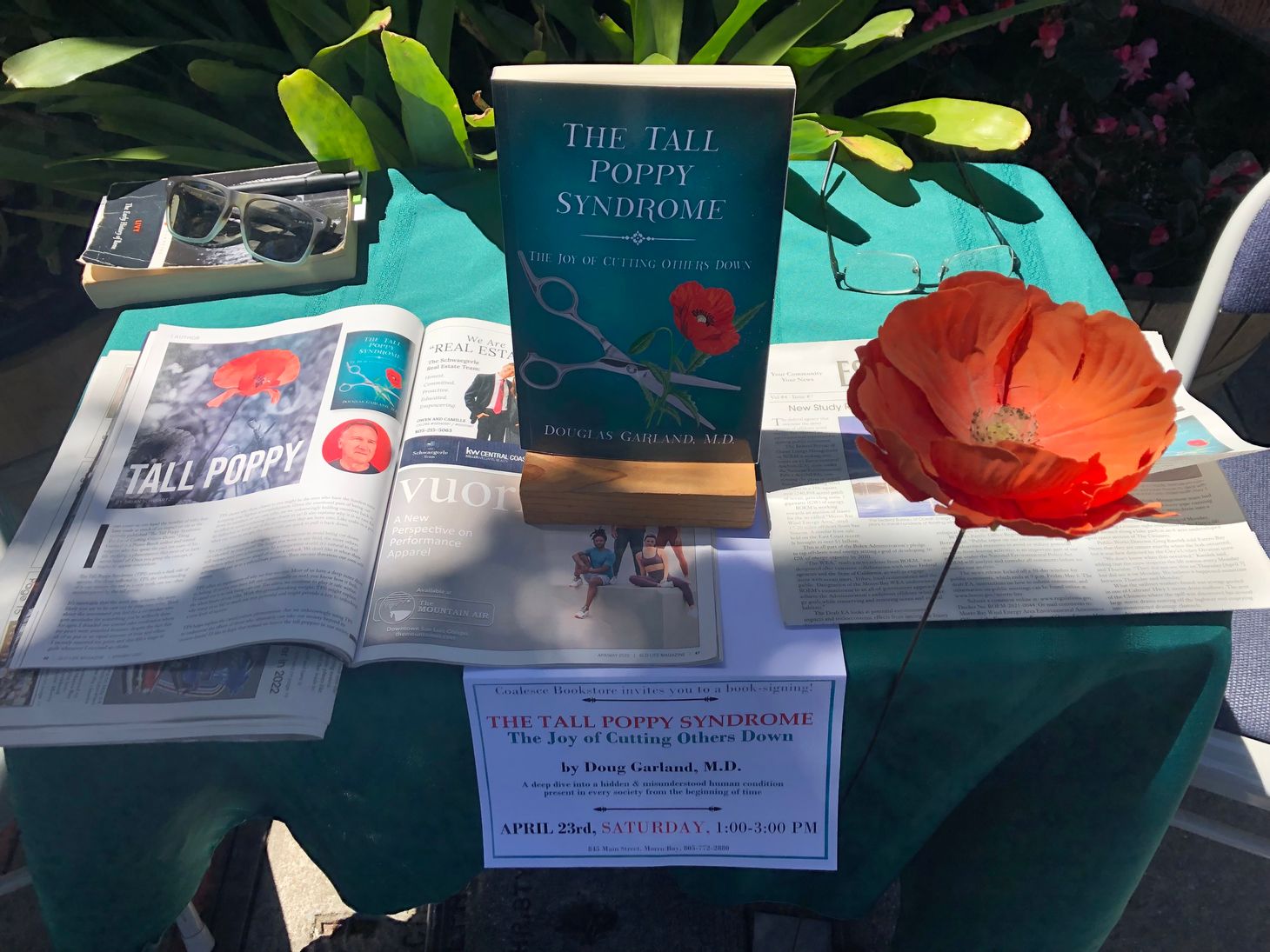Book Excerpt: Oppenheimer

The article below is taken from my book The Tall Poppy Syndrome: The Joy of Cutting Others Down (pgs. 194-197). Like many of you, I have seen the wonderful new Christopher Nolan movie 'Oppenheimer' which had a different point of view. Of course, I tend to view the world through the tall poppy lens. I thought you might be interested in my original take on the subject. Enjoy!
Oppenheimer versus Teller
(and the US Government)
Norman Feather stated Tall Poppy Syndrome (TPS) is uncommon in artists, scientists, and professionals. I have found just the opposite. Many have rivalries within their tribes, and many are envious of others' skill sets, knowledge, or successes.
In October 1939, President Franklin Roosevelt received a hand-delivered letter composed by Leo Szilard and signed by Albert Einstein. Szilard was a Hungarian-born physicist of Jewish parents. He patented the nuclear chain reaction in 1933 and, with Enrico Fermi, the first nuclear reactor in 1934. The letter laid out the case for beginning work on an extremely powerful bomb created by a nuclear chain reaction in a large mass of uranium.
Roosevelt called for an Advisory Committee on Uranium. Using their recommendations, he established the National Defense Research Committee (NDRC) in 1940 and allocated money for uranium research. In 1941, after learning of a larger and more advanced British atomic bomb project, President Roosevelt approved a full atomic program and created the Office of Scientific Research and Development (OSRD) to secure large engineering projects.
Armed with more funds after the attack on Pearl Harbor, the NDRC chairman enlisted physicist J. Robert Oppenheimer to work on a fast-neutron chain reaction in an atomic bomb. Oppenheimer was a Jew educated at Harvard, Christ's College, Cambridge, and the University of Gottingen, a leading center for theoretical physics. Further studies followed at the California Institute of Technology, Harvard, the University of Leiden, and the Swiss Federal Institute of Technology. He had landed a professorship at the University of California, Berkeley in 1928.
In the summer of 1942, Oppenheimer hosted a planning seminar for the bomb and included Edward Teller. Also, the government formed the Manhattan Engineer District and transferred the Manhattan Project to them from OSRD. Brigadier General Leslie Groves of the Army Corps of Engineers became head of the project in September. Oppenheimer now headed the secret weapon's laboratory in Los Alamos, New Mexico, and again added Teller to his team. Teller arrived at Los Alamos in 1943 and assisted Oppenheimer with talent recruitment and organization of the project.
A Hungarian-born Jew, Edward Teller had graduated from Germany's Karlsruhe Institute of Technology and obtained his PhD in physics at the University of Leipzig. He spent the summer of 1932 in Rome, studying with Fermi. Hitler's rise to chancellor of Germany in 1933 and his treatment toward Jews prompted Teller's departure to England. He went to the US in 1938 to work at George Washington University and became a citizen in 1941. His time in Germany during Hitler's rise to power joined with the political climate and revolutions in Hungary to forge an animosity in Teller toward Communism and Fascism. He had personally driven Szilard to Einstein's home the night Einstein signed the letter to Roosevelt.
Oppenheimer supported social reform and belonged to Communist-front organizations. Although he never joined the party, some considered him guilty by association: A former girlfriend wrote for a Communist Party newspaper. His wife had been a radical Berkeley student and Communist Party member. This activity was enough for the FBI, under J. Edgar Hoover, to open a file in March 1941, often bugging Oppenheimer's office and home, tapping his phone, and opening his mail.''
At some point, his friendship with Teller turned into a rivalry: Teller was envious of Oppenheimer's intellect and resented his influence over colleagues. And Oppenheimer chose another for the directorship of the theoretical division, a post Teller coveted. Their greatest difference, however, was Teller's interest in developing a fusion weapon rather than the current fission weapon. The fusion bomb he referred to as the "Super" would later be known as the hydrogen bomb.
Since Teller's heart was not in creating the fission weapon, Oppenheimer moved him out of the theoretical division completely and into a special group to study the Super. This section would be folded into Fermi's division, which also included Maria Goeppert-Mayer (a German-born American theoretical physicist who would receive the 1963 Nobel Prize in Physics).
After World War II, both men went separate ways. Oppenheimer appeared on the covers of Time and Life magazines. After teaching at Caltech and directing the Institute for Advanced Study at Princeton, he moved on to become the chairman of the General Advisory Committee to the Atomic Energy Commission (AEC) in 1947. Members of the committee blocked the development of Teller's hydrogen bomb, but President Harry Truman overrode that when the Soviet Union tested their first atomic bomb in 1949.
Meanwhile, Teller had turned down the opportunity to direct the theoretical division at Los Alamos in 1945 and left for the University of Chicago in 1946, where his close friends Fermi and Goeppert-Mayer were. He returned to Los Alamos in 1950 to develop the hydrogen bomb, based partly on his designs. However, he was passed over as director of the development-production project and left in 1952 to direct the newly established Lawrence Livermore National Laboratory in California, which was created at his urging. The bomb was tested on November 1, 1952, based on a 1951 Teller publication.
The rivalry between Teller and Oppenheimer continued, becoming more political when the air force wanted strategic long-range thermonuclear weapons (hydrogen bombs) instead of Oppenheimer's smaller tactical fission weapons the army used. Joined by a US senator, the chair of the AEC, Lewis Strauss---Oppenheimer's nemesis---pushed to revoke his security clearance because of his opposition to the hydrogen bomb, which the current administration favored. Oppenheimer had been under continuous FBI investigation since his testimony before the House Un-American Activities Committee in 1949, where he had named names, some say to save himself.
Based on a review of their files, the FBI identified twenty-one reasons that "more probably than not J. Robert Oppenheimer is an agent of the Soviet Union." The AEC suspended his security clearance in 1953 while they decided whether he was a security risk. They offered to let him resign, but he requested a hearing.
The hearing began in April 1954, with Strauss as the chief appellate judge. The FBI was intimately involved, basing formal charges partly on a secret interview of Teller in 1952. After responding with mostly complimentary remarks, Teller had stated: "To this extent I feel that I would like to see the vital interests of this country in hands which I understand better, and therefore trust more. In this very limited sense I would like to express a feeling that I would feel personally more secure if public matters would rest in others' hands." Now the FBI threatened Teller's old friend Groves because of his involvement in a cover-up, so he testified against Oppenheimer at the hearing.
They revoked Oppenheimer's clearance by a two-to-one vote after years of power struggles and controversies. This led to an outrage by the scientific community and his martyrdom (scientific creativity versus the military). Oppenheimer died on February 8, 1967. KGB archives would confirm in 2009 that Oppenheimer had never been involved in espionage.
Oppenheimer had many cutters. Red-baiting initiated it, which almost always brought the FBI into the act. The AEC joined the fray, led by Strauss. Teller finished it off. Communist sympathizing and leaning generated a lot of emotion without much reasoning for many Americans.
The envious Teller had "stabbed him in the back," which is Dolchstoss in German. I call it TPS. The scientific community banished Teller for nearly the remainder of his life. According to a Japanese proverb, "If you seek revenge you should dig two graves."
Perversely, the knife had cut both ways, and the schadenfreude was on Teller in the end.
References
"The Einstein-Szilard Letter---1939," Atomic Heritage Foundation, July 18, 2017, https://www.atomicheritage.org/history/einstein-szilard-letter-1939.
"Franklin D. Roosevelt," Atomic Heritage Foundation, accessed October 14, 2020, https://www.atomicheritage.org/profile/franklin-d-roosevelt.
Michel Rouzé, Encyclopedia Britannica Online, s.v. "J. Robert Oppenheimer," last modified April 18, 2020, https://www.britannica.com/biography/J-Robert-Oppenheimer.
"Leslie R. Groves," Atomic Energy Foundation, accessed August 7, 2020, https://www.atomicheritage.org/profile/leslie-r-groves.
The Editors of Encyclopedia Britannica, Encyclopedia Britannica Online, s.v. "Edward Teller," last modified January 11, 2020, https://www.britannica.com/biography/Edward-Teller.
"Oppenheimer Security Hearing," Atomic Heritage Foundation, July 7, 2014, https://www.atomicheritage.org/history/oppenheimer-security-hearing.
William J. Broad and Walter Sullivan, "Edward Teller, a Fierce Architect of the Hydrogen Bomb, Is Dead at 95," New York Times, September 11, 2003, https://www.nytimes.com/2003/09/11/us/edward-teller-a-fierce-architect-of-the-hydrogen-bomb-is-dead-at-95.html.
Lawrence Badash, Encyclopedia Britannica Online, s.v. "Enrico Fermi," last modified March 3, 2020, https://www.britannica.com/biography/Enrico-Fermi.
"US Tests," PBS, accessed August 8, 2020, https://www.pbs.org/wgbh/americanexperience/features/bomb-us-tests/.
Esther Inglis-Arkell, "The Heartbreaking Feud between Edward Teller and J. Robert Oppenheimer," Gizmodo, January 21, 2014, 1:20: p.m., https://io9.gizmodo.com/the-heartbreaking-feud-between-edward-teller-and-j-robe-1505532276 and Atomic Heritage Foundation, "Oppenheimer Security Hearing."
Atomic Heritage Foundation and Jerrold Schecter et al., "Was Oppenheimer a Soviet Spy? A Roundtable Discussion," Wilson Center, accessed August 8, 2020, https://www.wilsoncenter.org/publication/was-oppenheimer-soviet-spy-roundtable-discussion.
"If You Seek Revenge You Should Dig Two Graves," Quote Investigator, July 7, 2019, https://quoteinvestigator.com/2019/07/07/two-graves/.
Tall Poppy Syndrome Newsletter
Join the newsletter to receive the latest updates in your inbox.



